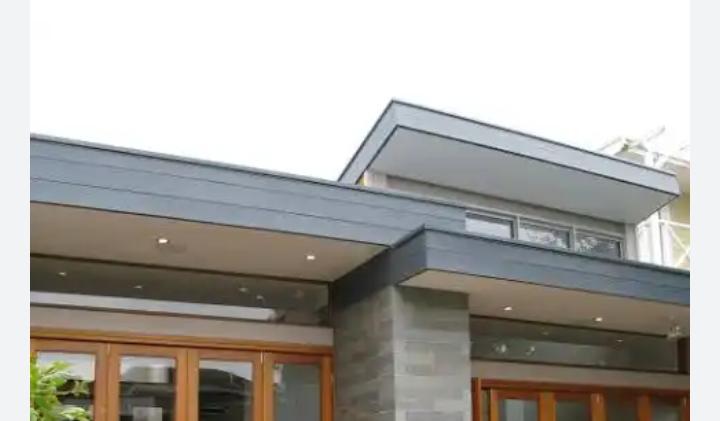Parapet Roof price in Nigeria
Table of Contents
What is a Parapet Roof
A parapet roof is an extension of the exterior wall that rises above the roofline, forming a protective barrier around the roof perimeter. Typically, it consists of a low wall or railing with a flat or sloping top, which can serve various purposes. This architectural element may be constructed using various materials, such as concrete, bricks, stones, or metals, depending on the design and structural requirements of the building.
Purpose and Benefits of Parapet Roofs
The parapet roof offers a range of advantages that make it a valuable addition to Nigerian buildings. Some of the key purposes and benefits include:
Functionality and Advantages of Parapet Roof
Waterproofing and Drainage:
One of the primary functions of a parapet roof is to prevent water from seeping into the building. By creating a protective barrier around the roof’s edges, it acts as a shield against rainwater, preventing water damage and leaks. Furthermore, parapets can incorporate drainage systems, directing rainwater away from the roof and ensuring effective water management, especially during heavy rainfall or storms.
Wind and Fire Resistance:
In Nigeria, where extreme weather conditions can be a concern, parapet roofs offer enhanced wind resistance. The raised walls act as a buffer against strong winds, reducing the likelihood of structural damage during storms. Additionally, parapet walls can also act as fire barriers, limiting the spread of fires between adjacent buildings and increasing overall fire safety.
Aesthetic Appeal and Versatility:
Parapet roofs contribute significantly to the overall aesthetics of a building. They add character, style, and architectural interest, making the structure stand out from the surrounding buildings. Moreover, parapets can be designed in various styles and shapes, allowing architects and homeowners to express their creativity and achieve a unique look that complements the building’s design.
Additional Space and Usability:
The parapet wall, when designed with the appropriate width and height, can provide additional functional space. This space can be utilized for various purposes, such as creating rooftop gardens, terraces, or outdoor seating areas, enhancing the living experience and the value of the property. In urban settings with limited space, parapet roofs offer an innovative way to optimize the use of available area.
Types of Parapet Roofs:
a. Box Parapet Roof:
The box parapet roof is a popular choice in Nigeria due to its simplicity and clean lines. It features a flat, continuous wall along the edge of the roof, providing a seamless appearance. This type of parapet roof is well-suited for modern and minimalist architectural designs.
b. Embattled Parapet Roof:
The embattled parapet roof is a classic and timeless choice, often seen in traditional and historical buildings. It features a series of alternating raised sections and recessed portions, creating a visually striking appearance. This design offers a touch of sophistication to the building’s facade.
c. Plain Parapet Roof:
The plain parapet roof, as the name suggests, is a simple and unadorned design that complements various architectural styles. It consists of a straight, low-height wall along the edge of the roof, emphasizing functionality over ornamentation.
Disadvantages of Parapet Roofs:
While parapet roofs offer several advantages, they also come with some disadvantages that should be considered during the construction or renovation process:
a. Maintenance Challenges:
Parapet walls are exposed to various weather conditions, making them susceptible to water damage and deterioration over time. Regular maintenance is essential to prevent leaks and structural issues.
b. Cost:
The construction of parapet walls can add to the overall cost of the building, especially if intricate designs are incorporated. Homeowners and builders should carefully budget for this additional expense.
c. Structural Considerations:
Incorporating a parapet roof requires careful planning and structural reinforcement, as the walls add weight to the roof. Inadequate support can lead to structural problems in the long run.
d. Safety Concerns:
Roof parapets should be designed and built with safety in mind. Low parapet walls may pose falling hazards, especially in multi-story buildings, and thus, proper safety measures must be implemented.
Price of Parapet Roof in Nigeria?
1. Precast parapet: 7,000 to 14,000 naira per meter
2. Concrete parapet: 16,000 to 20,000 naira per meter
3. Aluminum parapet: 12,000 to 17,000 naira per meter
Where to Buy Parapet Roofs in Nigeria?
1. Best Roofing Materials Limited.
Located in Iyana, Lagos. They have a wide variety of parapet roofs in stock, including precast concrete parapets and aluminum parapets. Their address is 1, Ogunlana Drive, Iyana, Lagos. Their phone number is 0805 900 5022.
2. Authentic Roofing Company.
Located in Lagos. They also have a wide variety of parapet roofs in stock, and they offer installation services as well. Their address is 12, Otunba Adeola Odeku Street, Ikoyi, Lagos. Their phone number is 0816 828 6632.
3. Kovarite Roofing LTD Stone Coated Tiles Warehouse is located in Lagos. They specialize in stone-coated roofing tiles, but they also carry a variety of parapet roofs. Their address is 16, Ogunlana Drive, Iyana, Lagos. Their phone number is 0807 409 8577.
What is a parapet roof, and how does it differ from other roof types?
Answer: A parapet roof is a type of flat or sloping roof that has a low wall or railing (the parapet) around its perimeter. Unlike other roof types, which end at the eaves, a parapet extends above the roofline and offers additional architectural and functional benefits, such as providing a barrier against falling and enhancing the aesthetics of the building.
What are the advantages of installing a parapet roof in Nigeria?
Answer: Installing a parapet roof in Nigeria can offer several benefits. It helps improve the building’s aesthetics, gives the structure a distinct appearance, and can enhance the overall architectural design. Additionally, the parapet acts as a protective barrier, reducing the risk of accidents, and can serve as a support for installing rooftop elements like solar panels or water tanks.
Are parapet roofs suitable for all types of buildings in Nigeria?
Answer: Parapet roofs are versatile and can be used for various types of buildings in Nigeria, including residential, commercial, and institutional structures. They are particularly popular in urban areas, where they contribute to the modern and stylish look of buildings.
What materials are commonly used for constructing parapet walls in Nigeria?
Answer: The materials used for constructing parapet walls in Nigeria can vary depending on the budget, design, and location of the building. Common materials include bricks, concrete blocks, precast concrete panels, and sometimes metal or wooden elements. The choice of material should consider factors like weather conditions and the load-bearing capacity of the building.
How do I ensure that my parapet roof is properly waterproofed?
Answer: Proper waterproofing is crucial for a parapet roof in Nigeria, considering the country’s climate. Ensure that the parapet walls and roof surface receive a reliable waterproofing treatment using suitable materials. Hiring a professional roofing contractor with experience in parapet roof installations is highly recommended to ensure a leak-free and long-lasting solution.
Can a parapet roof accommodate rooftop amenities like gardens or recreational areas?
Answer: Yes, a parapet roof can be designed to accommodate rooftop amenities such as gardens, terraces, or recreational spaces. However, this will require proper engineering and structural considerations to support the additional weight and ensure the safety of occupants using these amenities.
How do I maintain a parapet roof to prolong its lifespan?
Answer: Regular maintenance is essential to prolong the lifespan of a parapet roof in Nigeria. Inspect the roof and parapet walls regularly for signs of damage, cracks, or water leakage. Clear any debris that may accumulate on the roof and ensure that the drainage system is functioning correctly. It’s advisable to schedule annual inspections with a professional roofer to catch and address potential issues early.
Are there any building codes or regulations specific to parapet roofs in Nigeria?
Answer: Building codes and regulations in Nigeria generally cover roof construction, including parapets. It’s essential to adhere to the relevant local building codes and regulations when designing and constructing a parapet roof. Engaging an architect or engineer familiar with local guidelines can help ensure compliance.
Can I convert an existing roof into a parapet roof?
Answer: Converting an existing roof into a parapet roof is possible, but it requires careful planning and execution. Engage a qualified structural engineer or architect to assess the feasibility and structural integrity of the conversion. Ensure that the building’s foundation and load-bearing capacity can support the additional weight of the parapet walls and make any necessary reinforcements.
What are some popular design options for parapet roofs in Nigeria?
Answer: Parapet roofs in Nigeria can be designed in various styles to suit the building’s architecture and owner’s preferences. Some popular design options include stepped or tiered parapets, modern minimalist designs, decorative parapets with intricate patterns, and parapets that incorporate safety railings for rooftop access.

